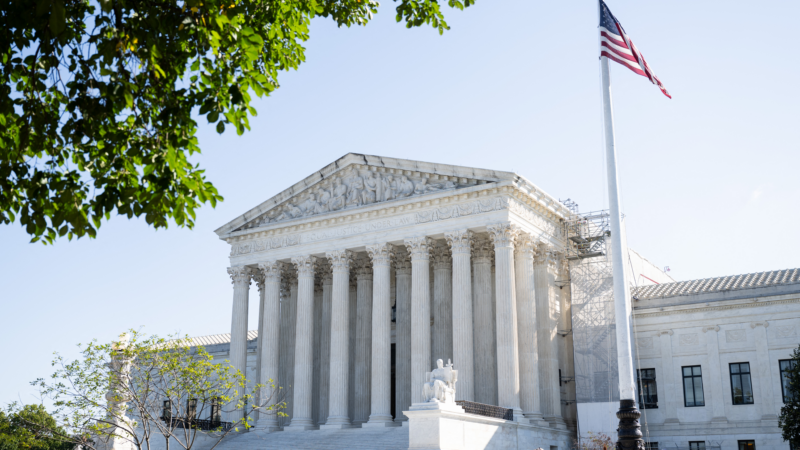Supreme Court refuses legal lifesaver for former Trump chief of staff
The Supreme Court dealt a major legal blow to former White House Chief of Staff Mark Meadows on Tuesday, refusing to move the Georgia election interference charges against him from state to federal court.
The court’s action came in a routine one-sentence order, with no noted dissents.
Meadows is one of 18 people indicted in state court on charges of illegally conspiring to keep then-President Trump in office after he lost the 2020 election. Trump was indicted on similar state charges, but the Supreme Court earlier this year granted him broad immunity from prosecution for his official acts, and presumptively immune beyond that. Meadows sought to leverage that decision to apply to him, contending that the charges against him should at least be moved from state to federal court because he was a federal officer at the time the alleged conspiracy took place.
But the 11th Circuit Court of Appeals, based in Atlanta, ruled that Meadows is no longer a federal official, and that even if he were, his actions were “not related to his official duties.” Among other things, Meadows was on the 2020 phone call with Trump when the then-president unsuccessfully sought to pressure Georgia Secretary of State Brad Raffensperger to flip the state vote. Or as Trump put it in the tape-recorded conversation: “All I want to do is this. I just want to find 11,780 votes, which is one more than we have.”
Were Meadows to have been tried in federal court, the charges against him almost certainly would have been dismissed by the Trump Justice Department. Instead, he faces state charges in the sprawling election tampering conspiracy case dating back to 2020. That case, however, was put on hold after a Georgia appeals court agreed to review whether Fulton County District Attorney Fani Willis should be removed because of her romantic relationship with the special prosecutor she hired to handle the case.
New York rent control challenge case
In another action Tuesday, the Supreme Court declined to hear a case challenging New York’s rental control law.
The law, first passed during World War II, was amended in 2019 to strengthen tenants’ rights in the state, especially New York City, Buffalo, and other urban and suburban areas. The changes included a limit on rent increases or lease renewals, narrowing the circumstances when a landlord can evict a tenant in order to take over the space for personal use and restrictions on landlords seeking to convert rental space into condominiums.
Challenging the law were New York landlords, all of whom have units subject to the rent stabilization Laws. They contended that the law infringed on their rights to do as they wish with their property and that it caused them financial harm. Specifically, they contended that the law amounted to an unconstitutional taking of their property without just compensation.
The Second Circuit Court of Appeals dismissed their claim, declaring that the government did not take the challengers’ property, since the building owners voluntarily entered the rental market and are still able to evict tenants. The challengers promptly appealed up to the Supreme Court, but to no avail.
Justice Neil Gorsuch noted that he wanted to hear the case.
The Supreme Court’s conservative supermajority has been very receptive to claims that the government is unconstitutionally taking property, but Tuesday’s action follows previous instances where the court has declined to involve itself in rent control controversies.
New York City is regarded as one of the most expensive cities in the world, with the cost of living driven by sky-high housing prices. According to the Office of the New York State Comptroller, housing affordability has worsened in New York City in the past decade, with the median rent price increasing faster than the median income. Similar patterns have showed up in other parts of the country as well.
Ilana Dutton contributed to this story.
Party City files for bankruptcy and plans to shutter nationwide
Party City was once unmatched in its vast selection of affordable celebration goods. But over the years, competition stacked up at Walmart, Target, Spirit Halloween, and especially Amazon.
Sudan’s biggest refugee camp was already struck with famine. Now it’s being shelled
The siege, blamed on the Rapid Support Forces, has sparked a new humanitarian catastrophe and marks an alarming turning point in the Darfur region, already overrun by violence.
FDA approves weight loss drug Zepbound to treat obstructive sleep apnea
The FDA said studies have shown that by aiding weight loss, Zepbound improves sleep apnea symptoms in some patients.
Netflix is dreaming of a glitch-free Christmas with 2 major NFL games set
It comes weeks after Netflix's attempt to broadcast live boxing between Jake Paul and Mike Tyson was rife with technical glitches.
Opinion: The Pope wants priests to lighten up
A reflection on the comedy stylings of Pope Francis, who is telling priests to lighten up and not be so dour.
The FDA restricts a psychoactive mushroom used in some edibles
The Food and Drug Administration has told food manufacturers the psychoactive mushroom Amanita muscaria isn't authorized for food, including edibles, because it doesn't meet safety standards.







